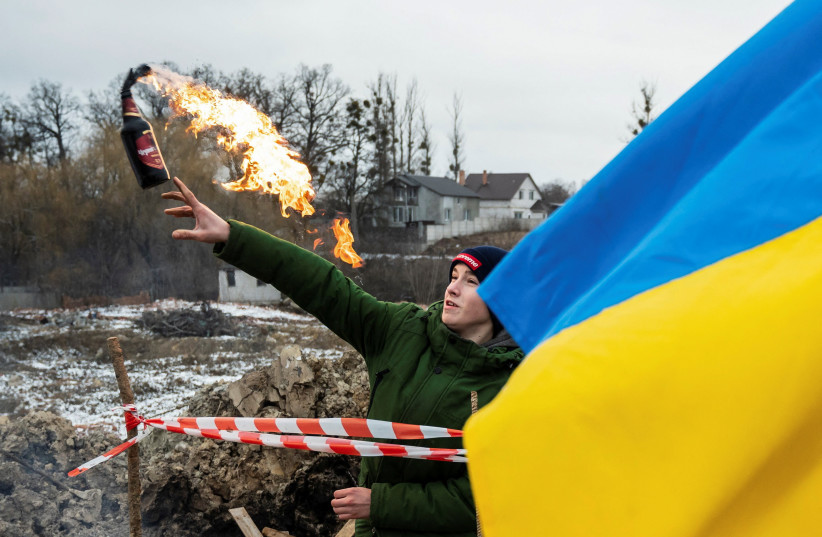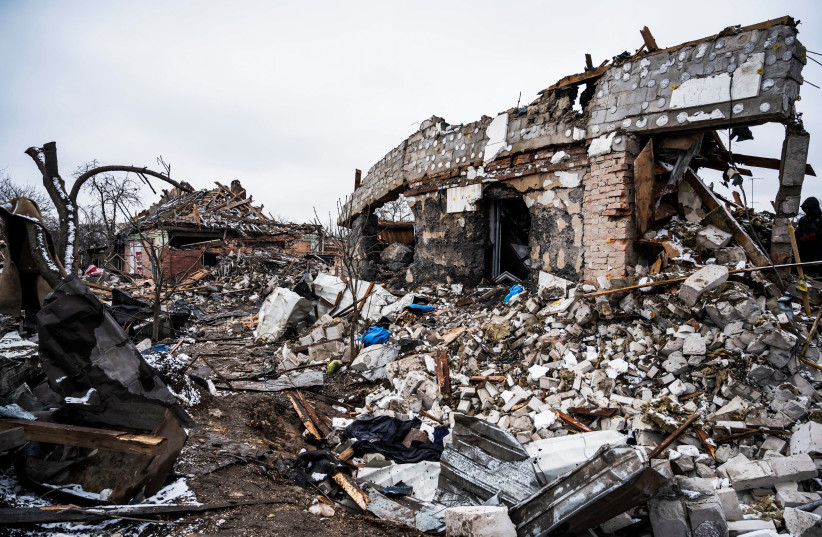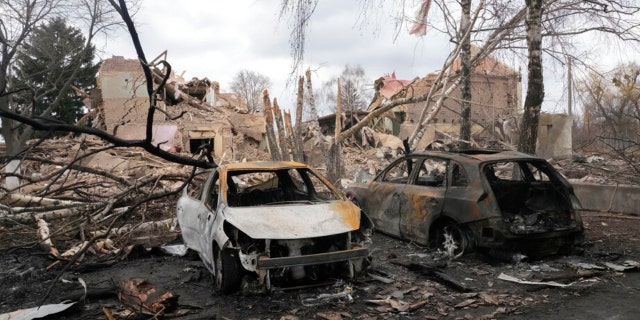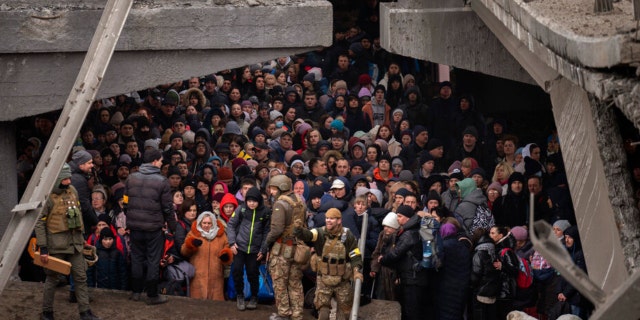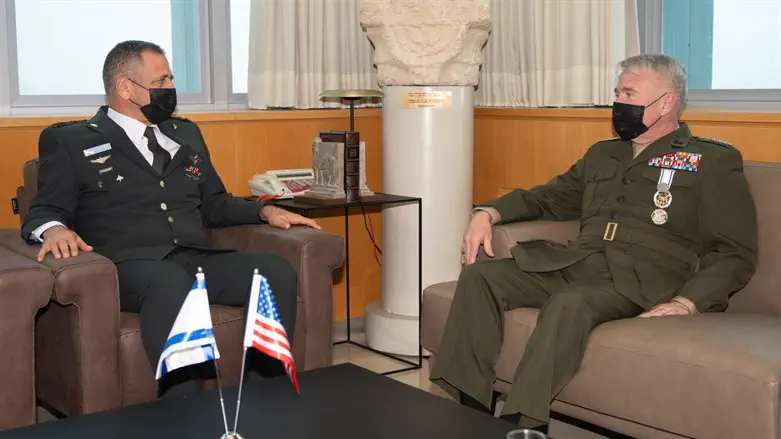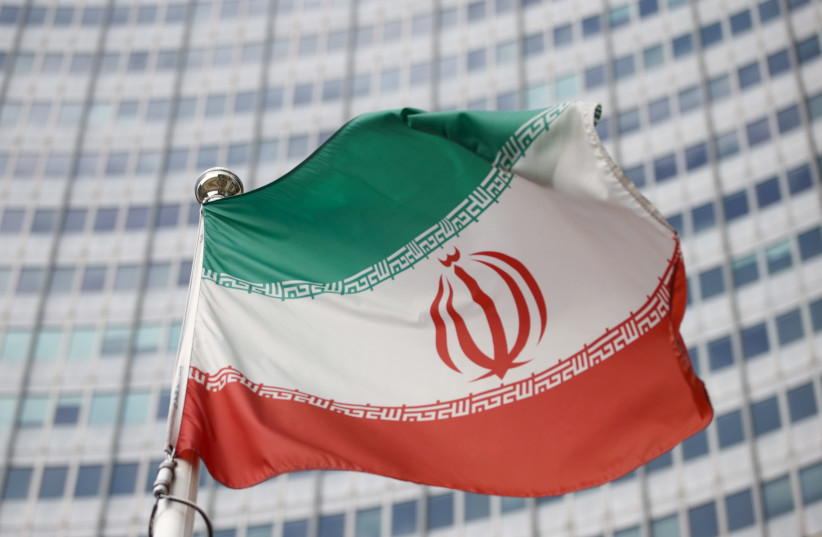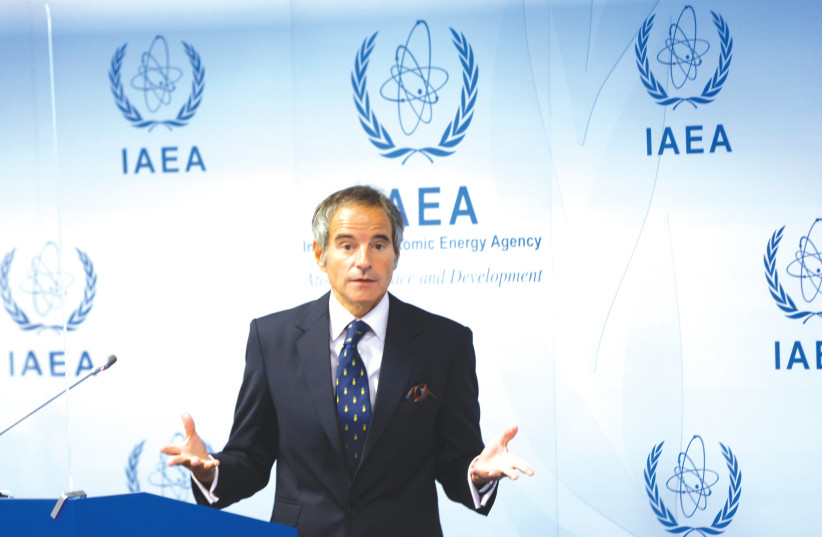by Eugene Kontorovich
Hat tip: Dr. Jean-Charles Bensoussan
The same rules apply.
Secretary of State John Kerry spent the spring shuttling between his two major foreign-policy concerns—Russia’s control over Crimea and Israel’s control over the West Bank—entirely unaware that he was engaged in a world-historical irony. Both these situations turn on identical international-law principles. Indeed, the failure of the United States to apply these principles consistently has led to the long-standing failure of its Middle East initiatives, while inadvertently opening the door for Russian aggression.
The legal principle that explains why Crimea was and remains under Ukraine’s sovereignty also validates Israel’s presence in the West Bank.
Let us start with the less controversial case. The international community agrees that, despite Russia’s annexation, Crimea remains sovereign Ukrainian territory. On March 27, the UN General Assembly voted 100 to 11 to continue to recognize Crimea as part of Ukraine. Russia cannot rewrite Ukraine’s frontiers at will.
But, as many foreign-policy realists argued while Vladimir Putin was making his move, it is not all that clear why Crimea should belong to Ukraine in the first place. The substantial majority of the population is ethnically, linguistically, and religiously Russian. The majority of its population probably prefers to be ruled from Moscow rather than Kiev (though not by the 90-plus percent margin of the recent shotgun referendum). The territory is adjacent to Russia and has been part of Russia historically.
So why Ukrainian sovereignty over Crimea? The answer: Nikita Khrushchev’s caprice. In 1954, the first secretary of the Central Committee detached Crimea from the Russian Soviet Socialist Republic and gave it to the Ukrainian Soviet Socialist Republic. He did not consult the Crimeans, but it did not much matter, as everyone was ruled from the Kremlin anyway. From that moment on, official internal Soviet borders included Crimea in Ukraine.
Thus, all Ukraine has for its claim of title to Crimea is a dead dictator’s whim. But for international law, that is more than enough. When new countries emerge from old ones or from colonial empires, the last official international borders constitute the new boundary lines. This doctrine is known as uti possidetis iuris (meaning “you possess under law”). It has been applied to the borders of new states around the world and recognized as a basic principle of international law by the International Court of Justice. Even when several states emerge from one, as Russia and Ukraine did from the USSR, the prior internal administrative divisions become the new international frontiers.
Most striking, this principle applies in full when the old borders were colonial or otherwise undemocratically imposed. If it were not so, new countries would be born with all their borders in dispute, and endless frontier conflicts between neighbors would ensue. That is why international law sets the last official boundaries, even colonial provincial boundaries, as the permanent ones. Subsequent aggression cannot change them, as the reaction to Russia’s Crimean conquest shows.
Now let us apply these principles to Israel.
The disintegration of the Ottoman Empire in World War I led to the division of its territories in the Middle East. The core of the Ottoman Empire became the new country of Turkey, which, in turn, surrendered all Turkish sovereignty over Ottoman territory in the rest of the Middle East (not just Israel, but also modern-day Iraq, Syria, Lebanon, and Jordan). Instead of imposing their own sovereignty on the parts of the Ottoman Empire they conquered, Britain and France allowed the newly created League of Nations to transform these territories into “mandates.” The European states were committed to shepherding the mandates into new independent nation-states. The League did so pursuant to an explicit clause in its charter that authorized it to create such mandates out of the lands “formerly belonging to the Turkish Empire.”
In 1922, the League of Nations established a new “country” to serve as the Jewish national home. This was the Mandate for Palestine. Under certain provisions of the Mandate, Palestine was partitioned at the Jordan River to create the country of Transjordan (now called Jordan) on its eastern bank. After that, international frontiers of Mandatory Palestine ran from the river to the sea. The League of Nations Mandate for Palestine provides the legal basis not only for Israel’s borders, but for those of Jordan as well, and indeed for Jordan’s entire existence.
Israel is the state created in Mandatory Palestine. Thus under uti possidetis iuris, it inherits the Mandatory borders. The only question is whether anything has happened since the 1920s that legally modified these frontiers.
Three events are commonly cited as justifying the non-application of the uti possidetis doctrine. First was the UN General Assembly’s 1947 partition proposal, Resolution 181. Second was the partially successful 1948–49 Arab attempt to prevent the establishment of a Jewish state in Palestine, which led to the Green Line of 1949. Third was the UN Security Council’s response to Israel’s retaking of these territories in the Six-Day War.
The Partition Proposal
Resolution 181 did not, as many seem to think, “create” the Jewish state. That had been done on paper 25 years earlier by the League of Nations Mandate, and later through Israel’s declaration of independence and War of Independence—a struggle in which the UN did nothing to promote the survival of the fledgling state.
Resolution 181 proposed an elaborate seven-sector division of Mandatory Palestine, an idea the Jewish leadership was willing to accept, but that the Arabs rejected. The General Assembly Resolution did nothing to alter the Mandatory borders because the GA is not a world legislature: It has no legal power to make any binding rules, let alone redraw the borders of nations.
Indeed, the resolution itself explicitly recognizes that the Assembly has no power to legislate its recommendations. If the GA were to vote today to “partition” Ukraine, it would be similarly ineffectual. The 1947 plan was a proposal for a compromise that, if accepted by both sides, would have been binding, but which had no force in itself.
Israel declared independence on May 14, 1948, with a document that “proclaim[ed] the establishment of the Jewish State in Palestine, to be called the Medinat Israel.” Under the uti possidetis iuris principle, the borders of the new state were those of Mandatory Palestine. The new state was immediately invaded by all its neighbors, who succeeded in occupying much of its territory. But the 19-year-long occupation of parts of the Mandate by Egypt and Jordan did no more to change its borders than has Russia’s equally unprovoked aggression against Ukraine today. Indeed, if Jordan’s occupation changed Israel’s borders, surely Russia’s 20 or so years of controlling Transnistria should change Moldova’s borders and Turkey’s 40-year occupation of Cyprus should change that country’s borders.
The Green Line
Israel concluded armistices with its neighbors in 1949. These were not peace treaties. They were temporary agreements to stop shooting. The “Green Line” of 1949 was simply the demarcation of the separation between Israeli and Arab forces. Without establishing any sovereign border, it thereby preserved the Mandatory boundary. All of Israel’s armistice agreements reflected this, including the Israeli-Jordanian one: “The provision of this Agreement shall not in any way prejudice the rights, claims and positions of either Party hereto in the ultimate peaceful settlement of the Palestine question, the provisions of this Agreement being dictated exclusively by military considerations.” Other provisions also made clear that both parties recognized the Mandatory boundaries as the only international borders for Palestine. The only dispute was who would ultimately control it.
Thus the very document that formalized the Green Line specifically said it was not to be construed as a border, or anything other than a temporary line of separation between Israeli and Arab forces. When Israel expelled the Jordanian occupation forces after King Hussein attacked across the Armistice line during the Six-Day War, the need for such a separation came to an end.
President Barack Obama and his secretary of state, like so many others, use the phrase “1967 borders” to describe the Green Line; but it was explicitly not a border, nor was it created in 1967. Indeed, with the exception of Britain, no nation recognized Jordanian sovereignty over the territory of Mandatory Palestine during its 19-year occupation. When Jordan and Egypt signed peace treaties with Israel in 1979 and 1994, both nations expressly referred to the Mandate boundary as the current international border of Israel, demonstrating its continued relevance.
Resolution 242
The United Nations Security Council responded to the Six-Day War with its famous Resolution 242, which has set the basis for all subsequent action by the council. Before turning to the resolution’s text, we should note that, as was true of the General Assembly in 1947, the Security Council does not have the power to redraw preexisting national borders. Though the council has power under its charter to take certain “binding” decisions, those are limited to authorizing economic and military means to respond to breaches of the international peace; it cannot alter the underlying dimensions of UN member states.
No less important, Security Council practice requires the Council to refer explicitly to the textual source of its authority as Chapter VII of the UN Charter in order to make resolutions binding. The resolution does not include such a reference, showing that the Council understood its resolution to be nothing more than a recommendation.
Resolution 242 famously calls for “withdrawal of Israeli armed forces from territories occupied in the recent conflict.” This language was deliberately chosen by its drafters to reject demands that Israel withdraw from all territories it occupied, and instead leaves the scale of the withdrawal up to future diplomacy. The wording of 242 was drafted by the British delegation as a replacement for other versions that would have required leaving “all” the territories.
A vast literature has arisen to cope with the fact that the word the does not precede the word territories in that sentence, but like much discussion of the Arab–Israeli conflict, it puts questions concerning Israel in a unique legal universe. In fact, it is fairly easy to see whether using the language of territories would be a standard way for the Security Council to require complete withdrawal. I have identified 16 other resolutions demanding military pull-outs, of which four were prior to 1967. In each case, the demand for complete withdrawal is explicit, with language such as “withdraw from the whole territory” and “the territory” and with references to particular antebellum positions. The language of 242 is unique in the Security Council’s history, but consistent with its own drafting history and the document’s intentions. Thus reading 242 to require a complete withdrawal not only misreads the resolution, but also makes nonsense of 16 other important resolutions.
Some argue that 242 compels Israel to return to the Green Line, relying on the resolution’s preamble, which stresses the “inadmissibility of the acquisition of territory by war.” But that would be a strange way to require Israel to return their territorial seizures of 1949 to Jordan and Egypt. The next operative paragraph in 242, moreover, describes a withdrawal to “recognized boundaries.” The 1949 Armistice Lines were not “recognized boundaries” in any legal sense. They constituted nothing more than a stand-off.
So to recap: The League of Nations, acting pursuant to powers in its charter, established the territory of Mandatory Palestine in 1922, much as the Mandate system established the borders of most other Middle Eastern states. The UN General Assembly did not have the power to modify that territory with its 1947 Partition proposal. Nor did the pan-Arab aggression of 1948–49 and its subsequent reception by the international community.
To be sure, international sentiment has turned sharply against Israel’s control over much of this territory. But international law is not a popularity contest; if it were, Israel would have long ago been voted off the island.
None of this undercuts the common arguments for the creation of a Palestinian state. Those arguments are rooted in diplomatic and demographic considerations. But even if one accepts the idea that the Mandate gave Israel borders too large for the Jewish population, it does not therefore follow that the pan-Arab aggression of 1948–49 established presumptive or default borders. In fact, those can and should be defined only by mutual agreement between Israel and the Palestinians.
If one believes, moreover, that the vague doctrine of self-determination—which is generally not thought to entitle a people to an independent state—made an inarguable case for a Palestinian Arab state somewhere between the Jordan River and the Mediterranean Sea, uti possidetis would still be relevant. The doctrine make clear that the relevant boundaries have nothing to do with the 1949 Armistice Lines unless both parties agree they should.
Recall that when new states emerge, the doctrine dictates that their borders follow the last prior internal administrative division, such as state or provincial borders. Under the Mandate, Palestine was divided into six districts, no combination of which closely approximates the 1949 Armistice Lines. (For example, Gaza was lumped into one district with the entire Negev, while the area now called the West Bank straddled three different districts.) The 1993 Oslo Accords create three administrative divisions (Areas A, B, and C)—two under Palestinian jurisdiction and one under Israeli jurisdiction. Those lines make more sense under international law than the sum of the noncontiguous, illegal conquests by Egypt and Jordan in 1948–49.
The international community has, perhaps in sympathy with Palestinian claims, selectively forgotten the uti possidetis principle when it comes to Israel. Putin’s actions in Ukraine illustrate the dangers of such inconsistency. Once the world begins making exceptions to the uti possidetis doctrine, it opens the door to claims like Russia’s. After all, if an internationally established mandatory border does not continue to abide for a new country, why should the arbitrary frontier of a totalitarian dictator?
Russia’s quick takeover of Crimea—and, as of this writing, its incremental invasion of eastern Ukraine—also has significant political lessons for Israel about any potential agreement with the Palestinians. Russia’s dismemberment of Ukraine offers a frightening scenario of how a state of Palestine could continue effective activities against Israel in the wake of a peace treaty.
One of the main rewards promised to Israel for the creation of a Palestinian state in the West Bank and Gaza is that it would also give Israel internationally recognized borders. While these borders would be narrow, they would, it is said, enjoy the deep guarantee of international legitimacy. Nations would move their embassies to (West) Jerusalem. Israel would, as Tzipi Livni has said, be “put on the world map.” The perceived value of this deal stems from the view that in the 21st century, sovereign borders cannot simply be rewritten.
Crimea has proven that “19th-century acts,” as Kerry called them, are alive and well, and that the international community will do little to stop them. Consider Moscow’s methods for taking apart Ukraine.
First, it bided its time, waiting more than two decades. Of course, if a deal with the Palestinians lasts only that long before it is followed by new demands, it will have proved to be a disastrous bargain for Israel. Second, Russia focused on areas with significant concentrations of co-ethnic population. In those areas, it followed Hitler’s Sudetenland strategy of provoking riots and protests, and then protesting Ukraine’s response.
This is precisely Israel’s greatest fear: that after the euphoria of a peace deal, a newly emboldened Palestinian government, now with all the apparatus of a state, would begin stoking disorder among Israeli Arabs in the Galilee Triangle and Negev. Of course, Palestine would not be able to grab these territories in a single putsch, as Russia did with Crimea. Rather, it would seek to destabilize Israel, as Russia is now doing in Eastern Ukraine.
The Machiavellian goal would be to use Israel’s response to the fomented unrest in a kind of diplomatic jujitsu, to make the case that the Jewish state cannot be permitted to maintain sovereignty over its non-Jewish populace. Then would come the kinds of demands that have been afforded far too much respect when it comes to Russian claims in Ukraine—greater federalism, decentralization of power, all of which would be designed to empower disgruntled minorities who show greater fealty to the neighboring aggressor than to the state of which they are citizens. In such a situation, would the world rally to defend the internationally mandated borders when it showed so little appreciation for them in Israel’s case throughout so many decades?
No one with a serious understanding of international law asks if it is fair or just for Crimea to remain part of Ukraine, no matter the wishes of Crimea’s population. Entertaining such a question and making it part of the discussion would eventually lead to redrawing many of the world’s borders. As we have seen, the same principles that justify Ukraine’s claims to Crimea justify Israel’s claims to the West Bank.
Israel should not be too put out by the international community’s failure to apply its general rules to the Jewish state’s rights, for the Ukrainian crisis also shows the limits of those rules. Ukraine may enjoy international backing for its claims while Israel does not. But the Ukrainian crisis also shows that when it comes to action, the international community will be driven primarily by the exigencies and conveniences of the moment, not by considerations of legality or past promises. In the end, as has been the case since 1948, Israel will have to rely on itself.
Eugene Kontorovich teaches constitutional law at Northwestern University and heads the international law department of the Kohelet Policy Forum in Jerusalem.
Source: https://www.commentary.org/articles/eugene-kontorovich/crimea-international-law-and-the-west-bank/


